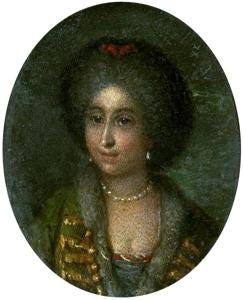Slow Read: Books of Jacob, chapters 28-30
"All these people I have around me now are total strangers." (Eva Frank)
Welcome to the Slow Read Along of Olga Tokarczuk, The Books of Jacob. You read along at your pace, and I guide you through the story, characters, and rich historical and cultural context.
This week, Chapters 28 to 30 of VI The Book of the Distant Country take us to the climax of the novel, the death of Jacob Frank. We meet Eva Frank, abused by her father, in grief for her father, released from her father’s grip, and then succeeding Jacob as a claimant Messiah, if surrounded by total strangers.
The Books of Jacob was in my list of 100 Books to Read Before it is Too Late. I hope you come to love this book as I do.
Olga Tokarczuk won the Nobel Prize in Literature in 2018.
Critics described The Books of Jacob as a “decade-defining book.”
Special Note for New Readers and Subscribers
You can check back and catch up on the whole Slow Read of The Books of Jacob, with hyper-linked lists of all posts, profiled characters, and guides on my Slow Read page.
If you are checking in on the Slow Read of The Books of Jacob for the first time, check these guides to this brilliant novel, the best historical fiction of the twenty-first century, in my humble opinion.
13 January - Tips on how to do the 'slow read' of The Books of Jacob
20 January - An overview of the characters of The Books of Jacob
27 January - Historical context of the 'Other Europe' in The Books of Jacob
We are getting close to the end. There is one more post to end the novel, and then I will do a wrap-up reflecting on the fantastic journey through history that we have taken.
The Story: Chapters 28 to 30
These three chapters takes us to the death of Jacob.
Chapter 28
Asher and Gitla have settled in Vienna where they participate in the coffee house public discourse, famously celebrated by Jurgen Habermas. Here they read Kant’s famous essay, “What is Enlightenment?” Asher meets Shlomo’s son, Franciszek Wolowski, and remembers sadly his early life in Rohatyn. We see Hayah Shorr in Poland where she occasionally prophesies and feels Yente’s presence. Franciszek Wolowski courts Eva Frank but is rejected. Jacob’s health worsens and he loses the favour of the court. Jacob dissolves his court and plans to leave. Burdened by debt, illness, miscreant children, and suspicion, Jacob accepts Thomas’s proposal to relocate the Frankists to a castle on the River Main, near Frankfurt. Nahman’s sadness deepens. His wife dies. He feels for Jacob’s alienation from his children. He meets Moliwda, shortly before this wanderer’s death. Moliwda has degenerated into bitterness and misogyny. He is a lost soul.
Chapter 29
Jacob and his entourage move to the castle in Offenbach. They become something of a tourist attraction and object of suspicious rumours. Jacob’s finances are a mess, and he quarrels with Thomas von Schönfeld whose get-rich-quick schemes keep failing. Jacob’s health is in decline, and his authority with his followers is fraying. He appoints Prince Jerzy Marcin Lubomirski, disgraced during the Partition of Poland, to be his honour guard. Meanwhile a local burgher and writer, Sophie von La Roche, befriends Eva, Jacob’s soon to be successor. At their salons, they listen to the music of Mozart that is taking Europe by storm. After Jacob has a health crisis, Nahman and Antoni Czerniawski compose a history of the Contra-Talmudists and of Jacob’s life. Czerniawski has growing informal authority in the group. Jacob uses Czerniawski’s authority to compensate for his weakening hold over his followers. He orders Czerniawski to procure the young women of the group to sleep with their Lord.
Thomas returns to the group and presents himself as Jacob’s successor. But Jacob’s followers see him as a philanderer and a fraud. Jacob beats and imprisons Thomas. Thomas says Jacob is a dying hypocrite. Despite Jacob’s approaching death and grandiosity, Eva too confronts her father. Soon after, Jacob dies, and Eva feels both loss and release.
Chapter 30
Chapter 30 focuses on how Eva replaces her father as the leader of the Frankists. But it begins with Gitla, Asher and Yente. Gitla dies on the same day as Jacob. Yente observes their death from her crystalline immortality in the Korolówka cave. Asher cared for Gitla till the end and came to abandon all belief in an immortal soul before her death. The news of Jacob’s death spreads to Poland and we read the ambivalent reactions of his former followers. The story skips ahead some years, and a nephew of Thomas von Schönfeld visits Eva at Offenbach. Eva leads the faithful and its academy, but the small community is indebted and pressured. Nahman continues to write his Scraps. Despite all his doubts and submission, he believes his service to Jacob was a way to study the light of the Zohar.
Question for Readers
So ends the life of Jacob and The Book of the Distant Country. Next week, the final chapter and final book, The Book of Names that will let us know the fate of the surviving characters. It will connect Jacob’s story to the many who followed and opposed him, including the tender narrator, Yente, in that cave in Korolówka.
QUESTION FOR READERS:
Which character from The Books of Jacob has intrigued you the most?
Below the paywall, I have some additional notes for paid subscribers on:
Character - Eva Frank
Context - The Female Messiah, Empress, and Novelist at the end of the ancien regime.




